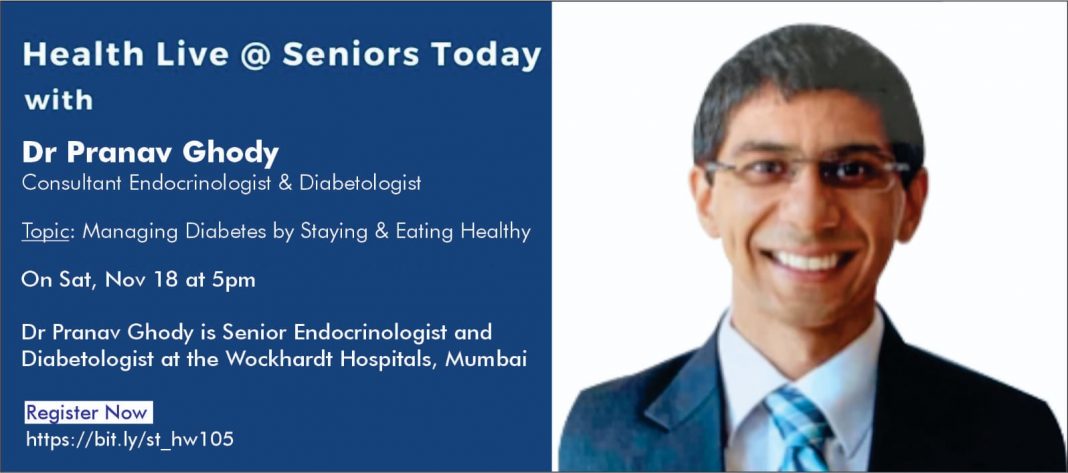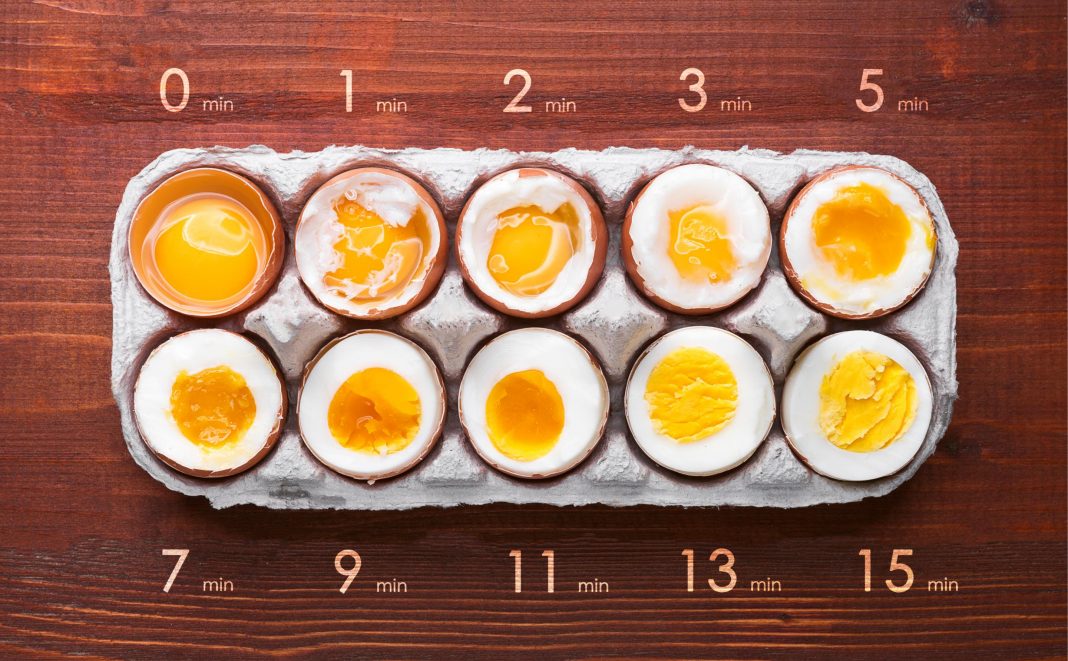Reading Time: 4 minutes
On 18 Nov, 2023, Seniors Today, to mark the occasion of World Diabetes Day (14 Nov), Seniors Today hosted their weekly Health Live Webinar with Dr Pranav Ghody. A Consultant Endocrinologist and Diabetologist Dr Ghody spoke on and answered questions about Managing Diabetes by Staying and Eating Healthy.
Dr Pranav Ghody is a Consultant Endocrinologist & Diabetologist. He completed his specialisation in internal medicine and specialisation in Endocrinology, Diabetes and Metabolism from New York, USA and practised there for seven years (Qualifications: Md(USA), DM(USA), FACE, CCD). He treats a wide spectrum of endocrine and metabolic disorders and has a special interest in treating thyroid, parathyroid and metabolic bone disorders.
Dr Ghody is a member of leading medical organisations in the United States and in India.
This session was especially organised on the occasion of World Diabetes Day on November 14, 2023 and the impact of fluctuating insulin levels that we may experience during the festive season.
The number of people with the Diabetes Mellitus type II has been exponentially increasing over the years, worldwide. And the festive season does play a role in it, but there are also a lot of other factors that play a part.
According to a survey consisting of data till July 2023, approximately 11% of our population is suffering from diabetes. Which amounts for approximately 10 crore people.
Another 15% suffers from pre diabetes- these are individuals whose blood sugar levels are borderline high and if no intervention is done, in the next few years, these individuals can end up with diabetes.
Another 40% of the population has obesity/ weight related challenges and a lot of these individuals may have other associated comorbidities, in the form of glucose intolerance, pre diabetes or diabetes.
1 in 4 people in our country suffer from some form of glucose related issues.
Diabetes is not the main concern, diabetes causes complications which are target organ damage which is the main concern and it troublesome.
It is the complications from diabetes mellitus that makes people suffer and can also lead to mortality.
Diabetes affects each and every organ in our body.
The number 1 cause for heart attacks is diabetes, so is the case with renal failure, stroke.
Number 2 cause for blindness in our country is diabetes.
Other complications include- amputations, nerve damage, pregnancy related complications, sexual dysfunctions.
If we lower the A1C by 1%, we can reduce these complications substantially (20-40% reduction in the complications).
The goal is to control the blood sugar levels and in turn the complications.
Obesity is defined by calculating the Body Mass Index (BMI) which takes into account your weight and height.
BMI =/<23 kg/m2 are considered to be normal
BMI = 23-25 kg/m2 are considered over weight
BMI /= 25kg/m2
Another way to define obesity is through the waist circumference.
You fall under the category of obesity if your:
Waist circumference > 35 inch- in male
Waist circumference > 30 inch- in female
The implication of obesity is high risk of development of Diabetes Mellitus Type II
Symptoms of Diabetes include:
- Excessive thirst
- Excessive intake of food
- Frequent urination
- Blurring of vision
- Delayed healing of wound
If you are experiencing any of these symptoms, the next step is to get yourself investigated and evaluated to confirm the diagnosis.
You need to get your blood sugar levels done at 2 separate occasions with a gap of few days/ weeks/ gaps/ months- and only if you receive the blood reports deranged at both instances, can you be diagnosed as a case of Diabetes Mellitus Type II.
The blood tests include
- Fasting Blood Sugar- done after 8-10 hours of fasting- abnormal if the value is more than 126mg/dl
- Glucose tolerance test- a glucose solution given and you blood sugar after 2 hours is more than 200mg/dL, it is said to be abnormal
- HbA1c values more than 6.5% is abnormal
If someone comes with any of the above mentioned symptoms and the random blood sugar level is more than 200mg/dL, it is said to be abnormal.
Preventive measure that can be taken for management of diabetes include:
- Healthy eating habits
- Physical activity
- Regular blood sugar level monitoring
- Medication
- Regular follow ups
Regardless of the modality of management, there is substantial evidence to prove that if an obese individual reduces 5-7% of their body weight, and maintain it, you can maintain your blood sugars much better. Thus weight reduction is the primary goal in an oases individuals with the diagnosis of diabetes.
The recommendation from ICMR (Indian Council of Medical Research) says that we should consume 1mg/kg of body weight of proteins every day.
Our meals are predominantly heavy in carbohydrates which is leading to the high number of individuals with diabetes.
A diabetic plate includes- 50% of non-starchy vegetables (thus it excludes potato, squash, corn), 25% of protein, 25% of carbohydrates (complex carbohydrates are preferred because they take longer to digest).
A good source of protein and complex carbohydrates is millets- ragi, Jawar, bajra. These are also high in antioxidants.
Another source of protein and fibre is beans- channa, rajma, soya bean
Alternative source of protein- paneer, tofu, baked chicken and fish, eggs
Nuts- high in proteins and unsaturated fats and anti-oxidants
Dehisced dals are also good sources of high fibre and anti-oxidants.
Consume fruits which are low in glycemic index, this include- orange, guava, cherries, strawberries, avocado, plum, apple and peach.
Frits should be consumed in their original form. Juices is not the same as the fruit. You lose a lot of fibre and antioxidants. The blood sugar also rises significantly when the fruit is consumed in the form of a juice.
Fruits should be staggered during the day for people with diabetes.
Processed food should be reduced/ avoided, if possible.
Eliminate sodas/ colas and juices
Even if you use an alternative/ substitute source for sugar such as honey, jaggery, etc., these will also cause a rise in the blood sugar levels.
You can replace sugar with natural source such as stevia.
Avoid skipping meals.




